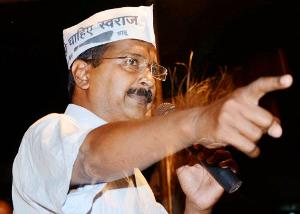 Varanasi, Apr 23: Pitching his 'aam-aadmi' credentials, Arvind Kejriwal on Wednesday on hit out at Narendra Modi and Rahul Gandhi for their "helicopter democracy" while projecting himself as an "honest" alternative.
Varanasi, Apr 23: Pitching his 'aam-aadmi' credentials, Arvind Kejriwal on Wednesday on hit out at Narendra Modi and Rahul Gandhi for their "helicopter democracy" while projecting himself as an "honest" alternative.
On his way to file his nomination papers for the Lok Sabha polls from this holy city, the AAP leader highlighted the "massive" spending in the advertisement campaigns for BJP's prime ministerial candidate and Congress vice-president and asked people to decide what kind of democracy they want.
"Somebody was saying that Modi is spending Rs 5000 crore in advertisements. Gandhi is also spending a lot of money. You watch TV, read newspapers, see billboards, they are there and everywhere. If he (Modi) is elected to power, he will make at least Rs 5 lakh crore.
"I am a fakir. I have no money. I will run a campaign on your money. You decide what do you want," he told a road show.
Accusing Gandhi of cheating the people of Amethi, Kejriwal said people told him that they kept electing the "family" member in hope their constituency will be developed. "Nothing happened and they feel cheated," he said.
"They (people) don't get to see him. They see only his helicopter flying in the sky. I hope it does not happen in Varanasi that you are pointed to a flying chopper and told that your leader (Modi) is there ... You decide if you want helicopter democracy or somebody who goes to villages and mohallas" he said.
Kejriwal is contesting against Modi in the high profile UP constituency.





Comments
Add new comment